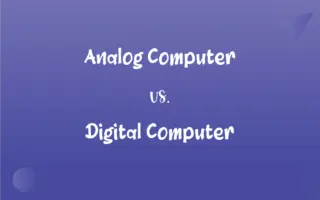Abstraction vs. Encapsulation: What's the Difference?
Edited by Aimie Carlson || By Harlon Moss || Updated on October 23, 2023
Abstraction hides complexity by showing only essential features, while encapsulation binds data and functions into a single unit and restricts direct access.

Key Differences
Abstraction, in the realm of software engineering, is the technique of emphasizing what a system does and obscuring how it achieves its functions. By implementing abstraction, developers can showcase the essential aspects of a component, while the intricate details are left hidden. This approach simplifies complex systems, making them more manageable for developers and users. For instance, when using a smartphone, the user interacts with a user-friendly interface without needing to understand the underlying code.
Conversely, encapsulation is about containing and protecting data and the functions that operate on that data. It ensures that the internal workings of a class or object are shielded from outside interference or misuse. By doing so, encapsulation guarantees data integrity and restricts access only through specified methods. Consider a bank account system: while you can deposit or withdraw money, you can't directly alter your balance without going through established channels.
Both abstraction and encapsulation are foundational concepts in object-oriented programming (OOP). While they serve different purposes, their combined use ensures well-organized and efficient code. Abstraction offers a high-level view of a system, facilitating ease of use and understanding, while encapsulation ensures data safety and clear role delineation within components.
A real-world analogy might aid comprehension: think of a car. Abstraction allows drivers to use the car without knowing its engineering intricacies, like the workings of its engine. Encapsulation, on the other hand, ensures that essential parts of the car, such as the engine or brake system, are securely housed and can't be tampered with randomly.
In essence, while both concepts deal with hiding details, abstraction focuses on simplifying by displaying only necessary elements, and encapsulation revolves around data protection and controlled access.
ADVERTISEMENT
Comparison Chart
Primary Purpose
Simplify by showing only essential features
Bind data and functions, restricting direct access
Usage
Emphasize what a system does
Protect and contain data and methods
Role in OOP
Fundamental for understanding system functionality
Ensures data protection and integrity
Benefit
Makes systems user-friendly and manageable
Maintains data safety and clear role boundaries
Example
Car drivers using a vehicle without understanding engine mechanics
Bank account system restricting direct alteration of balance
ADVERTISEMENT
Abstraction and Encapsulation Definitions
Abstraction
Hiding complex details while showing essential features.
A TV remote provides simple buttons, abstracting the complex circuits inside.
Encapsulation
Restricting direct access to some of an object's components.
Private variables in a class showcase encapsulation as they're inaccessible from outside.
Abstraction
The process of extracting essential information and ignoring specific details.
A map is an abstraction of a geographic area, showing key routes and landmarks.
Encapsulation
Combining data and functions into a single unit.
A class in programming encapsulates attributes and methods related to an object.
Abstraction
A simplified representation of something more complex.
Icons on a computer desktop are abstractions of complicated software processes.
Encapsulation
Protecting an object's state by bundling the data (attributes) and the methods (functions) that operate on the data into a single entity.
A software module controlling a printer's actions and data is an example of encapsulation.
Abstraction
In computing, a method to reduce complexity by focusing on high-level functionalities.
An operating system acts as an abstraction layer between software and hardware.
Encapsulation
The practice of keeping fields within a class private.
By using getters and setters, encapsulation ensures only safe operations are performed on data.
Abstraction
In OOP, representing essential features without including background details.
An application's user interface is an abstraction of its underlying code.
Encapsulation
In OOP, a mechanism of wrapping the data and the code that manipulates the data.
A capsule in medicine, which encloses the drug, is a metaphor for how encapsulation works in programming.
Abstraction
The act of abstracting or the state of having been abstracted.
Encapsulation
To encase in or as if in a capsule.
Abstraction
An abstract concept, idea, or term.
FAQs
Do both abstraction and encapsulation deal with hiding details?
Yes, but abstraction focuses on simplifying, while encapsulation focuses on protection and containment.
Is encapsulation only about making data private?
No, it's also about bundling data with the methods that act on it.
Which concept is more about data protection?
Encapsulation primarily deals with data protection.
How does abstraction benefit end-users?
It provides them with simplified interfaces, hiding complex technical details.
Why is abstraction important in programming?
It reduces complexity, making systems more manageable and user-friendly.
Can you have encapsulation without abstraction?
Yes, they are independent concepts, though often used together in OOP.
Can you break encapsulation in programming?
Yes, using techniques like reflection in some languages, but it's generally discouraged.
Can there be levels of abstraction?
Yes, systems often have multiple layers, each offering a different level of abstraction.
Do encapsulation and modularity relate?
Yes, both aim to bundle related components, but encapsulation emphasizes data protection, while modularity focuses on component independence.
What's a common tool to implement encapsulation in programming?
Access modifiers, like private, protected, and public, help implement encapsulation.
Why can abstraction be seen as a double-edged sword?
While it simplifies, over-abstraction can obfuscate details, making troubleshooting challenging.
How does encapsulation contribute to software robustness?
By controlling data access and modification, it reduces unintended side effects.
Is encapsulation unique to object-oriented programming?
While prominent in OOP, the concept can apply in other paradigms, wherever data and functionality need protection and grouping.
Can abstraction lead to inefficiencies?
Over-abstraction can introduce unnecessary complexity, potentially impacting performance.
How does encapsulation aid in software maintenance?
By restricting direct data access, encapsulation ensures changes in one section don't inadvertently affect another.
Do real-world objects exhibit abstraction?
Yes, many objects, like appliances, abstract their internal workings, providing users with simple interfaces.
How is abstraction applied in database systems?
Database systems use abstraction to provide various views of data, hiding specific storage and retrieval mechanisms.
Is every form of data hiding an example of abstraction?
Not necessarily. While abstraction often involves data hiding, the primary goal is simplification, not just concealment.
Is abstraction mandatory in software design?
While beneficial, it's not always mandatory. However, it's often recommended for complex systems.
How does encapsulation enhance code reusability?
By bundling data and methods, encapsulated components can be easily reused with consistent behavior.
About Author
Written by
Harlon MossHarlon is a seasoned quality moderator and accomplished content writer for Difference Wiki. An alumnus of the prestigious University of California, he earned his degree in Computer Science. Leveraging his academic background, Harlon brings a meticulous and informed perspective to his work, ensuring content accuracy and excellence.
Edited by
Aimie CarlsonAimie Carlson, holding a master's degree in English literature, is a fervent English language enthusiast. She lends her writing talents to Difference Wiki, a prominent website that specializes in comparisons, offering readers insightful analyses that both captivate and inform.































































